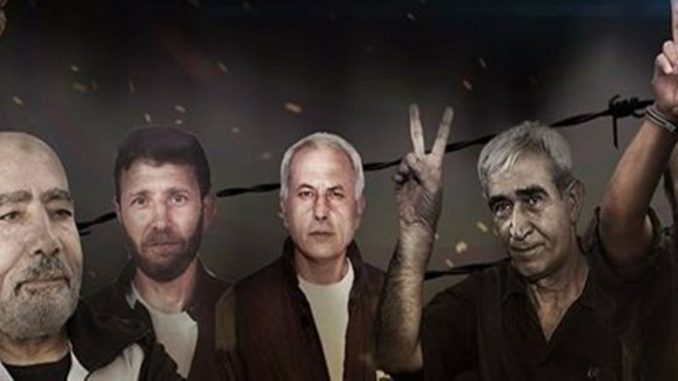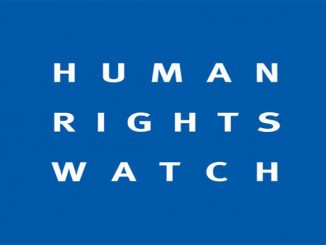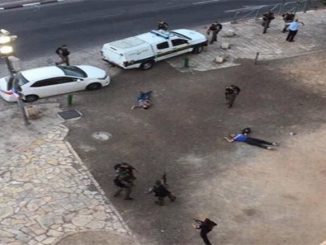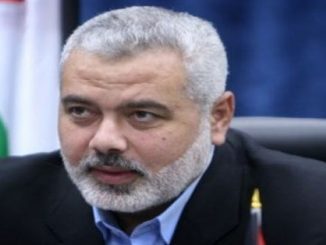
A number of hunger-striking Palestinian prisoners being held in solitary confinement began refusing water on Wednesday, as more than 1,500 Palestinians entered the 10th day of the mass “Freedom and Dignity” hunger strike.
According to the Media Committee for Palestinian Prisoners’ Hunger Strike — a joint committee formed by the Palestinian Prisoner’s Society (PPS) and Palestinian Committee for Prisoners’ Affairs — said that a number of prisoners being held in solitary confinement in Ramla prisons had stopped drinking water to protest attempts by the Israeli Prison Service (IPS) to suppress the hunger strike.
The committee identified one of the prisoners as Nasser Uweis.
Head of the Palestinian Committee for Prisoners’ Affairs Issa Qaraqe released a statement Wednesday saying that IPS forces had “continued to escalate punitive measures” against prisoners, which started on the first day of the strike, with IPS forces transferring prisoners and leaders of the strike to solitary confinement, and preventing lawyers from visiting prisoners, particularly sick prisoners.
According to Qaraqe, IPS officials have continued preventing prisoners — some of whom are refusing all forms of nutrition except salt and water — from accessing commissaries to purchase salt, provided prisoners with dirty sheets and covers, and carried out provocative search raids of prisoners rooms, and arbitrary transfers of prisoners.
Lawyers from the committee, Tamim Yunis and Yamin Zeidan, also announced that they had filed an appeal to an Israeli court in Haifa to allow them visit the longest-serving Palestinian prisoner, hunger striker Karim Yunis.
The committee noted in statement that “all legal efforts are still being conducted by legal institutions to enable lawyers to visit Palestinian prisoners on hunger strike.”
Qaraqe added that officials from the International Committee of the Red Cross (ICRC) — which is in charge of coordinating with Israeli authorities to arrange family visitations for Palestinian prisoners — would be visiting prisoners on Thursday to check on their health conditions.
The ICRC, according to Qaraqe, would be increasing the size of their field crews, as many prisoners had been transferred to prison field hospitals and clinics due to the deterioration of their health conditions.
Hunger-striking prisoner Nael Ali Najjar, from the Gaza Strip, told the committee that he had lost five kilograms since the beginning of the strike. Najjar is currently being held in solitary confinement in Israel’s Nafha prison.
Additionally, Qaraqe reported Tuesday evening that hunger-striking Palestinian prisoner Muhammad Abd al-Rabbu “started bleeding,” though the nature of his bleeding remained unclear.
The International Committee of Red Cross (ICRC) meanwhile visited Palestinian hunger strikers in Nafha, in order to monitor the conditions in which they were being held, as well as to transmit verbal messages from the prisoners to their families.
ICRC confirmed that it had increased its visits to Israeli detention facilities holding Palestinians since the beginning of the strike.
Meanwhile, the Democratic Front for the Liberation of Palestine (DFLP) announced that prisoner Samer al-Issawi and several other party-affiliated prisoners held in Nafha prison would join the hunger strike on Thursday.
The other DFLP prisoners were identified as Hussein Dirbas, Wajdi Judeh, Munther Snawbar, Hamzeh Dirbas, Haitham Antari, Hassan al-Bzur, Abd al-Rahman Mahmoud, Ayman Bisharat and Mutasem Yassin would be joining the strike alongside al-Issawi on Thursday.
Both al-Issawi and Snawbar ended an 11-day hunger strike last November after reaching an agreement with IPS officials regarding the treatment of female Palestinian prisoners being held in the Damon detention center.
Al-Issawi gained global recognition in 2012 when he began a hunger strike to protest being redetained by Israel after he was freed as part of the 2011 Gilad Shalit deal.
Upon signing a deal guaranteeing his release, the East Jerusalem native ended his strike in April 2013 after 266 days without food.
Al-Issawi was released in December 2013, only to be detained once again six months later.
The Palestinian Center for Human Rights (PCHR) released a statement Wednesday saying it was “strongly concerned” over the lives of the hundreds of hunger-striking prisoners, adding that “Israeli forces should be fully held responsible for the deterioration of prisoners’ conditions in light of the stubbornness of the IPS to meet their humane demands.”
PCHR called upon the international community “to fulfill their moral and legal obligations and oblige Israel to put an end to the suffering of thousands of the prisoners in the Israeli jails, including dozens who served around a decade and others served around 30 years in the prisons in addition to hundreds of patients, who suffer from serious diseases.”
The center noted that by its count, around 6,500 Palestinian prisoners were detained in 22 Israeli prisons and detention facilities, most of which are established in Israel, “constituting a flagrant violation of the Fourth Geneva Convention, particularly Article 76, which obliges the occupying power to detain prisoners from the occupied population in the occupied territories until the end of their sentences.”
“Most of those prisoners are residents of the West Bank, including 57 women and 300 children. Moreover, the number of sick prisoners is about 1,800 prisoners, including 180 prisoners who suffer from serious diseases in addition to 26 others who have cancer,” PCHR said.
Israeli authorities have detained approximately one million Palestinians since the establishment of the state of Israel in 1948 and the subsequent occupation of the West Bank, East Jerusalem, and the Gaza Strip in 1967, according to a joint statement released last week by Palestinian organizations. According to prisoners’ rights organization Addameer, some 6,300 Palestinians were held in Israeli custody as of March.



